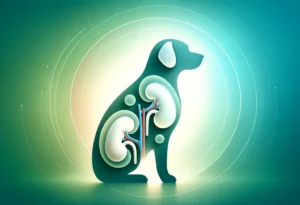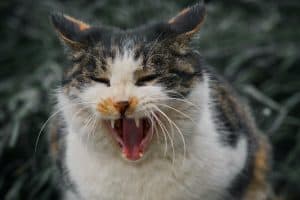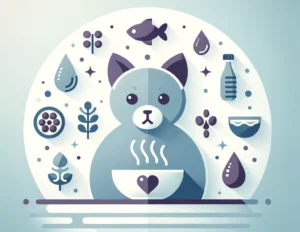Cats with kidney disease often exhibit strange behaviors, such as howling at odd times of the day or night. This can be concerning for pet owners, leaving them wondering why their feline companions are displaying this behavior.
Understanding Kidney Disease in Cats
Kidney disease in cats is a common condition that can have a significant impact on your feline friend’s health. The kidneys play a crucial role in filtering waste products from the blood, regulating blood pressure, and maintaining proper hydration. When the kidneys are not functioning properly, toxins can build up in the body, leading to a range of symptoms.
Common signs of kidney disease in cats include increased thirst, frequent urination, weight loss, and poor coat quality. As the disease progresses, cats may also experience vomiting, diarrhea, lethargy, and, in some cases, vocalization such as howling.
Regular veterinary check-ups and blood tests can help diagnose kidney disease early, allowing for prompt treatment to help manage the condition and improve your cat’s quality of life. Proper nutrition is also essential for cats with kidney disease, as special diets can help reduce the workload on the kidneys and support overall health.
For more detailed information on kidney disease in cats, you can refer to this guide from the American Association of Feline Practitioners.
The Connection Between Kidney Disease and Vocalization
Have you ever noticed your cat howling more than usual and wondered why? Interestingly, vocalization can be a common symptom of kidney disease in cats. As the disease progresses and toxins build up in the body, cats may become more restless, disoriented, or anxious, leading to increased vocalization, including howling.
In addition to vocalization, cats with kidney disease may exhibit other behavioral changes such as increased agitation, restlessness, and seeking out cooler areas to relax. These subtle signs can be important indicators that something may be wrong with your cat’s health.
If you notice your cat displaying these behaviors, it’s essential to consult your veterinarian for a proper diagnosis. Early intervention and proper management of kidney disease can help improve your cat’s quality of life and potentially slow down the progression of the disease.
Remember, understanding the connection between kidney disease and vocalization can help you provide the best care for your feline companion.
Tips for Managing Howling in Cats with Kidney Disease
Cats with kidney disease may howl due to discomfort or confusion caused by the illness. To help your feline friend cope with excessive howling, consider the following tips:
- Comfort and Reassurance: Provide your cat with a comfortable and secure environment to help alleviate anxiety and stress that may be contributing to the howling.
- Regular Vet Check-ups: Schedule regular check-ups with your veterinarian to monitor your cat’s kidney disease and adjust their treatment as needed.
- Stress Reduction: Minimize changes in your cat’s routine or environment to reduce stress levels, which can help lessen howling episodes.
- Proper Nutrition: Ensure your cat is on a kidney-friendly diet prescribed by your vet to support kidney function and overall health.
- Medication Management: Administer any prescribed medications as directed by your veterinarian to manage pain or discomfort associated with kidney disease.
- Behavioral Enrichment: Engage your cat in interactive play sessions or provide puzzle toys to keep their mind stimulated and alleviate boredom.
- Comforting Sounds: Play soothing music or provide white noise in the background to create a calming atmosphere for your cat.
By implementing these strategies, you can help your cat with kidney disease feel more comfortable and reduce excessive howling.
Other Behavioral Changes to Watch For
In addition to howling, cats with kidney disease may exhibit other behavioral changes that signal distress or discomfort. Here are some common signs to watch for and ways to address them:
- Increased or Decreased Appetite: Monitor your cat’s eating habits as kidney disease can affect their appetite. Offer wet food or warm it up slightly to entice them to eat.
- Litter Box Issues: Keep an eye on your cat’s litter box habits. Provide easy access to the litter box and consider using a shallow litter box for older cats with mobility issues.
- Lethargy: If your cat appears lethargic or less active, create a cozy and quiet space for them to rest comfortably.
- Vocalization Changes: Pay attention to changes in your cat’s vocalizations, as these may indicate pain or discomfort. Consult your veterinarian if you notice any significant shifts.
- Increased Water Consumption: Encourage your cat to stay hydrated by providing fresh water sources throughout your home and monitoring their water intake.
Remember, each cat is unique, so it’s essential to observe your cat’s behavior closely and seek advice from your veterinarian for tailored recommendations to address any behavioral changes associated with kidney disease.
Diet and Nutrition for Cats with Kidney Disease
Cats with kidney disease often howl due to the discomfort caused by the condition. One crucial aspect in managing kidney disease in cats is diet. A specialized diet low in phosphorus and with controlled protein levels can significantly impact their overall health and behavior. High-quality protein sources like eggs and chicken can be easier on their kidneys. Including amino acids such as taurine can also support their heart health. Remember, always consult with your veterinarian before making any changes to your cat’s diet.
Monitoring and Treatment Options
Monitoring your cat’s kidney disease is vital to ensure timely intervention and alleviate symptoms like howling. Regular blood tests to check kidney function, hydration levels, and electrolyte balance can help track progress. Treatment options may include fluid therapy to support kidney function and medications to manage symptoms. Remember, early detection and prompt treatment play a key role in improving your cat’s quality of life.
Additional Unique Insight:
Dietary supplements such as Omega-3 fatty acids can also be beneficial for cats with kidney disease, as they possess anti-inflammatory properties and can support kidney health. Consult with your veterinarian to determine the appropriate supplementation for your furry friend.
Providing Comfort and Support for Cats with Kidney Disease
Cats with kidney disease may howl due to discomfort, confusion, or even pain. It can be distressing to witness your feline friend in this state, but there are ways to help provide comfort and support. One key aspect is creating a comfortable environment for your cat. Make sure they have a cozy bed, access to their favorite spots, and a quiet space where they can relax. Additionally, try to minimize stress and anxiety by sticking to a routine, providing familiar smells, and offering plenty of love and attention. Remember, your presence and soothing voice can go a long way in calming your cat during these difficult times.
Ways to Reduce Stress for Cats with Kidney Disease:
- Create a safe space: Ensure your cat has a quiet area where they can retreat when they feel overwhelmed.
- Establish a routine: Cats thrive on predictability, so try to keep feeding and playtime consistent.
- Provide comfort items: Soft bedding, familiar toys, and even pheromone diffusers can help reduce anxiety.
- Monitor their behavior: Keep an eye on changes in behavior or vocalizations to address any discomfort promptly.
For further insight, consider consulting with your veterinarian to explore additional options for managing your cat’s kidney disease and addressing their vocalizations effectively.
Interesting Facts About Cats and Kidney Disease
Did you know that kidney disease is a common ailment in older cats, affecting around 30% of felines over the age of 15? This condition can lead to various symptoms, including increased thirst, weight loss, and yes, excessive vocalizations like howling. Understanding the underlying causes of your cat’s howling can provide valuable insights into their overall well-being.
Furthermore, kidney disease in cats is often manageable with early detection and proper treatment. Regular vet check-ups, a balanced diet, and maintaining hydration levels are essential in managing this condition and ensuring your cat’s quality of life. By staying informed and proactive, you can support your furry companion through their kidney disease journey.
For additional information on feline kidney disease and howling behavior, you can refer to reputable sources such as the American Association of Feline Practitioners (AAFP) for comprehensive guidance and resources.
Alex, a passionate animal lover, has experience in training and understanding animal behavior. As a proud pet parent to two dogs and three cats, he founded AnimalReport.net to share insights from animal experts and expand his knowledge of the animal kingdom.









